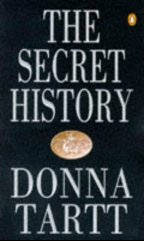2007 TBR Challenge #10
R.I.P. II Challenge #4
 To escape a miserable home life, Californian med school dropout Richard Papens signs up for a scholarship for an arts course at Hampden College, Vermont. There he becomes entranced by the five members of an elite Greek class, to the point of talking his way into their course. He enjoys the time spent in the company of his new classmates: aloof Henry, with his head in the intellectual clouds; flamboyant Francis, with a family even more dysfunctional than Richard’s own; the very unintellectual freeloader Bunny; and Charles and his beautiful twin Camilla. But he begins to notice oddities in their behaviour and grows suspicious. When the truth is finally revealed, Richard opts to keep silent, which paves the way for murder and the consequences that follow.
To escape a miserable home life, Californian med school dropout Richard Papens signs up for a scholarship for an arts course at Hampden College, Vermont. There he becomes entranced by the five members of an elite Greek class, to the point of talking his way into their course. He enjoys the time spent in the company of his new classmates: aloof Henry, with his head in the intellectual clouds; flamboyant Francis, with a family even more dysfunctional than Richard’s own; the very unintellectual freeloader Bunny; and Charles and his beautiful twin Camilla. But he begins to notice oddities in their behaviour and grows suspicious. When the truth is finally revealed, Richard opts to keep silent, which paves the way for murder and the consequences that follow.
This is not a murder mystery; thanks to a prologue that recounts events from the middle of the book, you go into it knowing who is killed by who and how. The only puzzle is how soon, why, and will they get away with it? For the most part, this works. It took me a while to get into it, but once I did the pages started almost turning themselves. Interesting characters, the questions about their fate, and a readable style made it easy to get through. But it suffered early on from a number of flaws that probably would have earned the book a lower grade if I hadn’t had several hundred pages to get used to them. I didn’t care about Richard and couldn’t see why he was so fascinated by the Greek class and willing to put his entire curriculum in the hands of their professor, essentially cutting himself off from the rest of the college. I couldn’t help but wonder how anyone as semi-literate as Bunny got into such a class in the first place, or believe that the others could be so immersed in the ancient world as to be astoundingly ignorant of events in the real one (Henry didn’t even know there’d been a moon landing). And the reason for the odd behaviour of Henry, Francis, Camilla and Charles struck me as completely implausible in a book that was otherwise solidly grounded in reality; the fantastical element just didn’t belong. Also, the author created two fictional countries, presumably either for the sake of invention or to avoid unflattering references to real ones. Either way it was a wasted effort as the names were recognisably similar to actual countries in the same parts of the world as the made-up ones. So why bother? But in spite of the bland narrator, the unrealistic elements, and the apparent non-existence of any Hampden College student not intensely intellectual or really into drugs and partying, it was still an engrossing read, which says a lot about the writing talent of the author.
Rating: B-











No comments:
Post a Comment